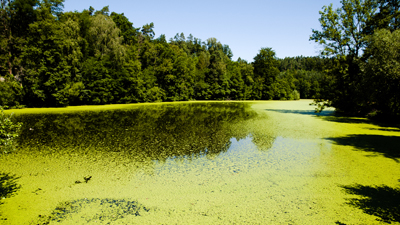
The term ‘Eutrophication’ is derived from the Greek word ‘eutrophic’ which means nourished or enriched. In context with the environment, the Eutrophication can be defined as the addition of artificial or non-artificial substances such as nitrates and phosphate, through fertilizers or sewage, to a freshwater system. It leads to an increase in the primary productivity of the water body or ‘bloom’ of phytoplankton.
Effects of Eutrophication:
1. Algal blooms cover the water bodies like river, lake, stream or ocean, blocks light from reaching the water which prevents the aquatic plants from photosynthesizing.
2. Lack of photosynthesis causes oxygen deficiency which results in a decline of marine species.
3. The hypoxic condition forms the dead zones which have not only negative ecological impacts but also have economic issues.
4. The water can have a bad taste, colour and odour, which has a negative effect on tourism. Governments have to invest more in wastewater treatment.
Effects of Eutrophication:
1. Algal blooms cover the water bodies like river, lake, stream or ocean, blocks light from reaching the water which prevents the aquatic plants from photosynthesizing.
2. Lack of photosynthesis causes oxygen deficiency which results in a decline of marine species.
3. The hypoxic condition forms the dead zones which have not only negative ecological impacts but also have economic issues.
4. The water can have a bad taste, colour and odour, which has a negative effect on tourism. Governments have to invest more in wastewater treatment.













